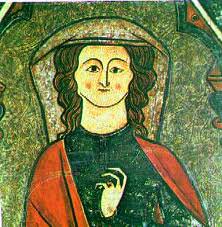Eleanor of Aquitaine and 12th Century Anglo-Norman Literary Milieu
By Eugenio Manuel Olivares Merino
Into Another’s Skin: selected essays in honor of María Luisa Dañobeitia, edited Mauricio D. Aguilera Linde; María José de la Torre Moreno (ed. lit.), Laura Torres Zúñiga (ed. lit.), 2012
Abstract: The purpose of the present paper is to cast some light on
the role played by Eleanor of Aquitaine in the development of
Anglo-Norman literature at the time when she was Queen of England
(1155-1204). Although her importance in the growth of courtly love
literature in France has been sufficiently stated, little attention has
been paid to her patronising activities in England. My contribution
provides a new portrait of the Queen of Troubadours, also as a promoter
of Anglo-Norman literature: many were the authors, both French and
English, who might have written under her royal patronage during the
second half of the 12th century. Starting with Rita Lejeune’s seminal
work on the Queen’s literary role, I have gathered scattered information
from different sources: approaches to Anglo-Norman literature,
Eleanor’s biographies and studies in Arthurian Romance. Nevertheless,
mine is not a mere systematization of available data, for both in the
light of new discoveries and by contrasting existing information, I have
enlarged agreed conclusions and proposed new topics for research and
discussion.
Introduction: Little do we know about the personality of the queen
whose wooden funerary effigy lies under the main dome in the Abbey of
Fontevrault. Eleanor of Aquitaine died in 1204, though the exact place
where she passed from the world is not known for sure: according to some
chroniclers, she ended her life in Poitiers; according to others, she
was taken to Fontevrault “where she put on the garb of a nun before
closing her eyes”. Her hands are holding a book, most probably a prayer
book, the Holy Bible – or, why not, a courtly romance… The granddaughter
of William IX of Aquitaine – the first known troubadour –, Eleanor, was
born in 1122 or 1124, somewhere in the far south of Aquitaine, probably
in Bordeaux or Belin, where she spent her early childhood before moving
to Poitiers after 1130. “Charming”, “welcoming” and “lively”, as
Geoffroi de Vigeois described her, she exercised an unquestionable
influence in the development and popularisation of the new courtly
sensibility in France. Highly intelligent and well-educated – she
probably knew Latin, Eleanor was the great patron of the two dominant
poetic movements of the time: the courtly love tradition, conveyed in
the songs of the troubadours, and the historical
Matter of Britain, best represented in Chrétien de Troyes’
roman courtois.


No comments:
Post a Comment